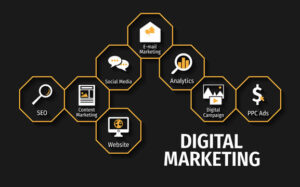DIGITAL MARKETING FOR SMALL BUSINESSES.
DIGITAL MARKETINGDIGITAL MARKETING FOR SMALL BUSINESSES
What Is Digital Marketing?
Digital marketing is the component of marketing that uses the internet and online based digital technologies such as desktop computers, mobile phones and other digital media and platforms to promote products and services.
Before we get too far into the nitty-gritty of digital marketing, let us look at some basic terms:
Digital Marketing Tools
This is the umbrella term used for any kind of online marketing effort, this includes digital channels like:
Search Engines e.g Google, Bing, Yahoo Search, Social media, Email marketing, Websites, Digital brochures, PPC advertising, Content marketing, Affiliate marketing, Native advertising and more. In short, if it is online, it falls under this umbrella. The internet is a big place, and there is an almost unlimited number of channels you could choose to reach your customers online, and strategies you could use to do it. The best digital marketers know which channels their audience uses and have a clear picture of how each asset supports their goals.
Inbound Marketing
This is about using marketing techniques to bring potential customers to you, rather than having your marketing fight for their attention. It is also known as ‘pull’ marketing, since you are ‘pulling’ your customers towards you. Inbound marketing is all about creating and sharing content that your prospects will find valuable, creating a ‘magnet’ to draw them to your business.
Outbound Marketing
The opposite of inbound marketing. Outbound marketing is all about you finding your customers, reaching out and starting the conversation yourself. It is often seen as the more traditional form of marketing, and includes things like cold calling, cold emailing/spamming, direct mail, event sponsorships, networking, TV advertising and even print advertising.
What are the benefits of digital marketing for small businesses?
Digital marketing provides small businesses with a number of benefits, including:
- The ability to reach a wider audience more quickly and easily than traditional marketing methods.
- The ability to target specific customers based on their interests and needs.
- The ability to track the success of campaigns and measure their ROI.
- The ability to create and share engaging content that attracts attention and drives traffic.
- The ability to connect with customers and build relationships through social media.
- The ability to create a more personalized experience for customers.
- The ability to automate marketing tasks and save time and money.
HOW TO SET UP DIGITAL MARKETING STRATEGY?
Setting up digital marketing tool models for your business may be a little bit difficult, but you need to narrow down what works for you and your business. But to set you off on the right foot, here are a few tips from us:
Set SMART Goals
A dream without a plan is just a wish. And in business terms, that means you need to set yourself goals in order to plan a digital marketing strategy. SMART is a good rule to use when setting yourself goals, which means your goals should be specific, measurable, achievable, and realistic and have a time frame. Set yourself goals for your marketing strategy and it will help you be a lot more successful.
Know Your Audience
If you do not know who you are selling to, then you cannot design a marketing strategy that will get their attention and deliver a message that is relevant enough to convince them to buy. The easiest way to do this is to create buyer personas so that you can create targeted campaigns.
Know Your Brand
Knowing what your brand stands for means you can position yourself in the market effectively, and showcase why customers should choose you over your competition. What is your USP, your distinct benefits, your value? Quiz yourself on what makes you special, ask your customers why they choose you, and use all of that to inform your marketing content.
Keep an eye on the Competition
Your competitors are not just those who offer a like-for-like service. They can be direct competitors, but you should also look at brands that offer different products but compete for the same space or budget as you, or who have a similar look and feel, or who target the same customers as you
Build Your Social Media Presence
Social media is one of the biggest tools you have in digital marketing. The average person in 2020 s
What are the different digital marketing channels for small businesses?
There are many digital marketing channels that you can use to reach and attract customers, including:
- Social Media – using platforms such as Facebook, Instagram, Whatsapp, Twitter, and LinkedIn to share content and engage with users.
- Email – sending automated messages to subscribers, or manually creating personalized messages.
- Video – sharing animated or live videos online.
- Display Advertising – promotional ads on websites and applications.
- Remarketing – showing ads to users who have previously visited your website.
- Content Marketing – creating content to attract and retain visitors.
- Google Adwords – paid search advertising.
In conclusion, Digital marketing is important to small businesses because it enables them to reach more people and build a larger customer base more quickly and cost-effectively than traditional marketing methods.
For more enquiry, you can contact us at SOW Professional Services Ltd for necessary supports to set up a digital marketing models for your business.
Website: www.sowprofessional.com
Phone: 07038254989
Whatsapp: 08152451523


